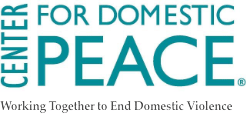Preventing Domestic Violence
As Center for Domestic Peace has learned more about the growing problem of domestic violence and the corresponding need for services, education, and prevention, we expanded to include strategies to promote more community involvement for solving the problem and have taken a leadership role in promoting social transformation through technical assistance, education, and policy initiatives.
Center for Domestic Peace works with individuals, at all age levels, to learn healthy and equal relating. We provided specialized training and technical assistance to various sectors of our community – health, schools, faith – to help institutions understand the role they can play to prevention domestic violence.
We also have various Community Action Teams (CATs) – that work on changing cultural and social norms that perpetuate domestic violence. At the heart of the CAT teams work is changing hearts, minds and policies on a community wide level, such as the work with young adults on Marin college campuses.
For more details on this website, click on links below:
Connect to the Global Effort to End Domestic Violence
TCTAT- Transforming Communities – Technical Assistance and Training Center
Domestic violence in the workplace
Domestic violence in the faith based settings
Highlights of recent prevention efforts include:
C4DP recently conducted agency trainings on how to identify potential domestic violence situations and design protocols on how to respond.
As a result of these trainings:
- Head Start has implemented a new question to their intake process, “Would you like information on healthy relationships?” If a parent responds yes, they then speak with an assessor, who has been trained to screen them using the project’s Parent Assessment Card. If this screening reveals a concern for domestic violence, they are screened further using C4DP’s Rapid Risk Assessment card and then referred to C4DP if necessary.
- Mental health clinicians at Jewish Family & Children’s Services received training to screen parents for domestic violence using the Parent Assessment Card. Evaluations showed the training helped clinicians feel more comfortable to address risk assessment.
- Marin City community stakeholders were trained to recognize the warning signs of abuse, how to support children & adult survivors of domestic violence, and the resources available for children and their parents at C4DP. As a result of the training, several community programs is Southern Marin have asked C4DP to participate in community outreach at the local elementary school and summer school programs.
- Behavioral health staff from two local medical clinics received training on C4DP’s trauma therapy program. As a result, the clinic has decided to institutionalize domestic violence response protocols by having all staff become trained in rapid risk assessment.
- Court Appointed Special Advocates (CASA) volunteers participated in a training to help identify the warning signs of children they work with who have been exposed to domestic violence. This will help connect children currently involved in court cases with C4DP’s therapeutic services.
If you are interested in our agency training programs, click here.
If you are interested in preventing domestic violence in the workplace, click here.
If you are interested in our national training center and technical assistance work, click here.
